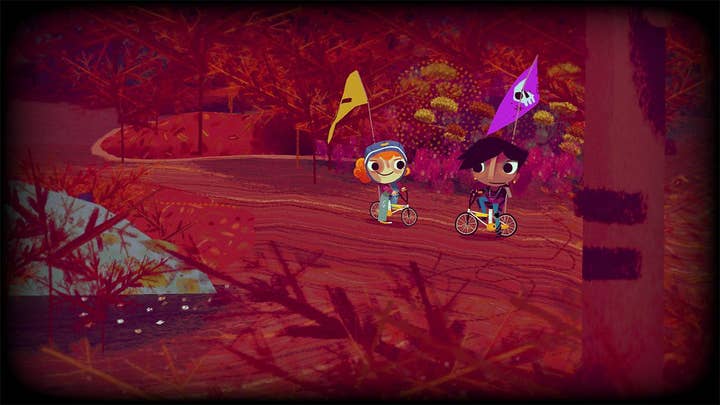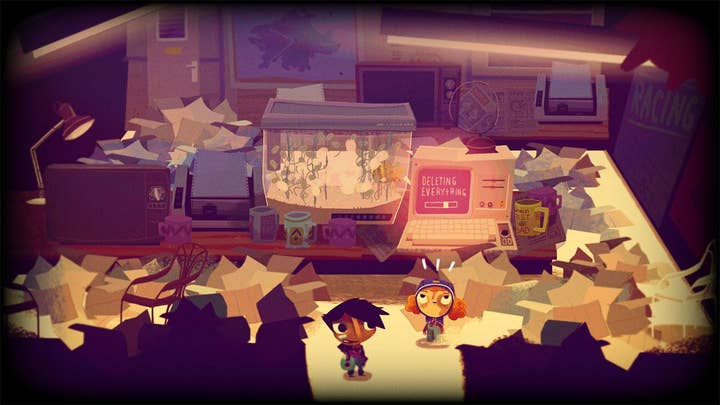Rex Crowle on getting over his tech fanboy phase
Knights and Bikes dev talks about next-gen hardware, streaming and subscription services, and bouncing between indie and AAA
During his presentation at the Montreal International Gaming Summit a couple months back, Foam Sword artist and designer Rex Crowle talked about the earliest games he made, bluntly telling the audience that they were just bad.
"They were bad because I was just learning, and I didn't really have anything to say with them at the time," Crowle said. "I was a bit too in love with the hardware and the software, rather than using it as a tool with an end game in mind. So the only statement I was really making with these games was that I like games and I want to make games. That's cool, but that's not necessarily interesting to other people. Why should they really care? I was just a fanboy for the technology, which is a bit like using a pencil to draw pictures of pencils."
It's safe to say the games Crowle makes now are better. Knights and Bikes was just nominated in two categories (Excellence in Visual Art and Excellence in Audio) for this year's Independent Games Festival Awards. Prior to this, he was lead creator on Tearaway, which won three BAFTA Awards (taking the Mobile & Handheld, Artistic Achievement, and Family categories) and was nominated in five others. That's to say nothing of his contributions to the LittleBigPlanet franchise.
"If you were there when the first pencil was invented, you'd be like, 'Oh my god, this pencil is so good!'"
Speaking with GamesIndustry.biz after his presentation, Crowle explained what precipitates such a shift from making games about the technology to making games with more to say, games that would be interesting to others.
"Once you get used to it," he explains. "Once it returns to being a tool again. If you were there when the first pencil was invented, you'd be like, 'Oh my god, this pencil is so good!' You'd be drawing on everything, just looking at it, putting it away in a special pocket you had for the pencil... Then after a while you don't think about it anymore. You just need to get an idea out and you don't notice you've picked it up and you're drawing. It's good when the tools, all this incredible technology, becomes everyday, and when kids who are making stuff -- whether in Unity, Minecraft, Dreams, or anything -- are able to just focus on the end result they want to come up with. It just becomes a tool again."
Given the ever-sharpening focus game engines and titles with user-generated content place on accessibility and lowering the barriers to game development, we ask Crowle if he thinks the industry is undergoing the same shift, just on a larger scale.

"It's always my hope with every new generation of hardware," he says. "We've reached that point where everything can be simulated so well that it's more about the ease [with which] you can make stuff rather than the super-shiny end result.
"I'm not sure if anyone needs 16k displays. I can't see pixels that small. So more of the hardware can be taken up by doing things a little less efficiently. Every time there's a new hardware launch, people say it's the end of pop-up and we won't need loading anymore, but we still do. You still have to optimize things quite hard. And it will be nice when we reach a point where you don't even have to think about that stuff."
"I fired up an Xbox recently and put Game Pass on it, and I'm not sure I'll buy another game, to be honest"
Even if the next generation does finally make good on those promises of technical capability, there's no telling how much that will benefit creators like Crowle. If on-demand game streaming takes off, or if all-you-can-play subscription services become the default way people play games, how will that impact the market for self-contained narrative-focused games like Knights and Bikes?
"That's the big question," Crowle agrees. "Having finished Knights and Bikes, that's definitely most of my headspace at the moment. What's next, and where is the right place to do it? I think streaming -- as in the Netflix-for-games approach -- could be really good for smaller, more experimental things... I do worry if it's calculated in terms of how many hours of eyeballs this entertainment gets on it, that it will skew it more back towards almost free-to-play style games. So I hope that short story experiences will still be viable on those sort of platforms."
Beyond determining how best to handle developer compensation, there are also concerns about how these new models could change consumer behavior.
"I fired up an Xbox recently and put Game Pass on it, and I'm not sure I'll buy another game, to be honest," Crowle says. "Because there are too many there already, and most of the things I want to play are there. Once you factor in PlayStation Plus, PlayStation Now, and multiple other services, it's a fight for people's time, really.
"But at the same time, it's never been a more exciting time for the types of voices that are getting to make games at the moment. It's just stunning the variety and seeing when the nominations for award shows being announced, it's going to be such a struggle to narrow the thousands of games coming out down to like, eight nominees."
As for his next project, it doesn't sound set in stone just yet. In his presentation, Crowle said he was eager for a break after doing a huge project like Knights and Bikes, where Crowle handled art, level design, and writing duties. It was the first project for Foam Sword, which Crowle created with co-founder Moo Yu, and we get a non-committal answer when we ask if Foam Sword is a one-off collaboration or a permanent partnership.
"Some amazing things can happen in AAA these days. In some ways it's a less conservative time with games like Control or Death Stranding, or what have you"
"Moo and I do think of it as an experimental partnership we did for this project and trying out a whole bunch of things, like Kickstarter," Crowle explains. "I enjoyed doing [Kickstarter] once; I'm not sure I would do it again because I've done that ride."
And while Crowle may not want to jump right to another large project after Knights and Bikes, he says he definitely feels an itch to return to AAA development at some point.
"There's often talk as if it's all one or the other, and you would always be in one camp or the opposing one," Crowle says. "But I think there are great strengths in both industries. The things AAA games are able to pull off is just mind-blowing because of the large teams and the way we're working together. And some amazing things can happen in AAA these days. In some ways it's a less conservative time with games like Control or Death Stranding, or what have you."
He later clarifies, "Looking back at a project from a larger team like Tearaway -- which was still tiny by usual first-party standards -- I can enjoy replaying the game and remembering little stories about each asset or decision or feature and all the things everyone brought to it. You see bits of your team's personality throughout the game and remember your own relationships with each other.
"And of course you still get that on a tiny project. When I replay Knights And Bikes, I still get those good memories popping up and think about the huge contribution that the rest of the team, namely Moo, Kenny [Young, who handled audio], Daniel [Pemberton, who did the music], our publishing pals at Double Fine all put in to make it what it is.
"But its just a little bit harder to get the same amount of distance from it or have quite as many mysteries. You know pretty much exactly how all the content came to be, because you were either making the thing, or in the conversations about making that thing. So you spend a bit less time wondering where the hell that crazy idea came from. What combination of brains and inspiration might have been behind that feature, while you were off in a meeting or out on a press tour? So on a much smaller team, you have the same good memories, just a few less memory puzzles for you to piece back together on how you all managed to make a thing together!"
Disclosure: MIGS provided travel and accommodations for GamesIndustry.biz to attend the event.









